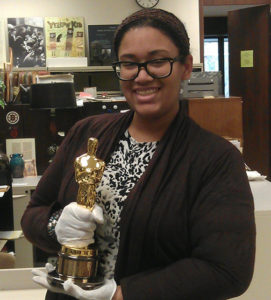Most academic librarians are responsible for providing instruction to students. Even though this is an essential aspect of academic librarianship, frequently, discussion of pedagogy or andragogy techniques does not come up in library school, leading to many academic librarians needing professional development and mentorship to hone their skills. These are some questions that have helped me during my reflection time when I have to prepare for the next semester of library instruction.
- What is your instructional style?
- What instructional style would you like to explore?
- Where are your growth opportunities?
- What are your instructional strengths?
- What resources have you discovered that you need to read and apply?
- Are there any library organizations or associations you are a part of that have instruction caucuses or sections?
- Are there any conferences or workshops coming up that focus on instruction?
In this blog post, I will interview Camille Chesley; she is the Head of Reference & Research Services at the University at Albany Libraries. Camille is a researcher, a leader, and, most of all, teaching is her expertise. She is willing to share her instruction journey with us, which involves mentorship, resource sharing, and seeking out educational opportunities.
Table of Contents
Jamia: How did you develop your instruction style?
Camille: I wish I could say that I developed my instructional style in an orderly, structured manner. Unfortunately, I learned on the job. I was lucky to have a lot of excellent mentors when I first started teaching. I sat in on instruction sessions and co-taught with more experienced librarians before striking out on my own, and these librarians were generous in sharing their instructional materials. I used to try to control every aspect of my instruction sessions because I was so nervous about potential disruptions, but I realized that I was doing students a disservice. I think more learning happens when you allow yourself to fail and model real-time problem-solving.
I also audited instructional design classes, which opened up an entirely new world for me. Before, I was working off of a combination of instinct and other librarians’ lesson plans. Still, I gradually gained the vocabulary, the background, and the confidence to begin thinking about and developing my own style and my own approach.
Jamia: How do you keep updated on the latest instruction style and techniques?
Camille: First and foremost, I try to keep an open mind so that I can continuously grow as a librarian and an educator. I think the most dangerous mindset is the “Oh, I know all of this already!” mindset. In these times, staying updated is usually in the form of webinars, articles, conferences, and other online opportunities, and I usually find these through emails, listservs, and social media. I also make sure that I branch outside of what might be considered “traditional” professional development related to library instruction. I strongly believe that growing as an instructor is more than learning about new tips and techniques. I seek opportunities to educate myself further about implicit biases, culturally sensitive pedagogy, anti-racist teaching strategies, and more.
Jamia: Can you please discuss your most-used instruction assessment tools?
Camille: I tend to rely more on formative assessment methods just because of the reality of library instruction. Most of us are limited to one-shots, maybe the occasional two-shot. I have used a mixture of methods, depending on the class and the environment and the feedback I’m seeking. I’ve used minute papers and online and in-person polling to assess prior knowledge and identify points of confusion during class. Some of these tools include Polleverywhere, Mentimeter, Padlet, Google Forms, Google Docs, and Zoom’s internal polls. I’ve even used note cards for polling students or requesting classroom feedback without computers. Assessment does not have to be high-tech!
Conclusion
As an academic librarian, I embrace lifelong learning as an important practice. If we want to continue to evolve, it is vital to understand the latest strategies, techniques, and tools regarding library instruction. Infobase has many great tools for academic librarians. Consider checking those out!

Biography:
Camille Chesley is Head of Reference & Research Services at the University at Albany Libraries. She received her MSLIS from the University of Illinois at Urbana-Champaign and her BA in East Asian Studies from Oberlin College. Her research interests include gamification in libraries, assessment, critical librarianship, and equity, diversity, and inclusion in LIS.
See also:
- FREE webinar: Teaching Information Evaluation with Lateral Reading, Session #1: The What and the Why
- FREE webinar: Teaching Information Evaluation with Lateral Reading, Session #2: The How
- FREE webinar: A Discussion of Harmful Coded Language: Decoding Whiteness and Anti-Blackness in Education
- Professional Reflection Time: Reflective Practice for Librarians



